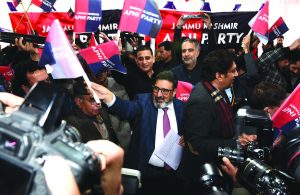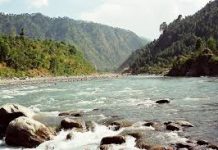 On March 8, former PDP leader and minister in the Mehbooba Mufti government Altaf Bukhari launched a new political outfit — Jammu and Kashmir Apni Party — heralding the start of political activity in the Valley following the withdrawal of Article 370 in August last which stripped J&K of its autonomy under India’s constitution.
On March 8, former PDP leader and minister in the Mehbooba Mufti government Altaf Bukhari launched a new political outfit — Jammu and Kashmir Apni Party — heralding the start of political activity in the Valley following the withdrawal of Article 370 in August last which stripped J&K of its autonomy under India’s constitution.
As was already well-known, Bukhari, a businessman turned politician didn’t hark back to Article 370 nor promised a fight for its restoration. On the contrary, he shifted the goalpost distinguishing his party on counts where others have been criticized. in a direct dig at the National Conference and the PDP, Bukhari said his party was not a dynastic enterprise.
“This party is not floated by a family and there will be a total restriction that anybody who becomes President of party cannot be elected more than 2 times,” said Bukhari who held the portfolios of education and finance. “It is a party by the commoners, for the commoners, of the commoners”.
However, hours before the launch of his party, Bukhari was unanimously elected as the president by the members of the outfit comprising of more than 30 leaders, including 23 former legislators and ministers from Peoples Democratic Party (PDP), National Conference (NC) and the Congress.
Some of them have been identified as Dilawar Mir, Noor Mohammad Sheikh, Yawar Mir, Zafar Iqbal Manhas and other former MLAs from the PDP; Usman Majeed, Aijaz Khan, Mumtaz Khan and Shoaib Nabi Lone from Congress; Vijay Bakaya, Syed Asgar Ali and Kamal Arora from NC. Apni Party will have representatives from all over J&K.
Bukhari said his party would “preserve the self-respect and dignity of people of the Union Territory and ensure dignified return of Kashmiri Pandits”. He also made clear that his political outfit will only pursue only what is achievable in an apparent reference to the apparently impossible demand for the reversal of the revocation of Article 370.
“We are not here to sell dreams and fantasies but will always be pragmatic, honest and fair in our approach,” Bukhari said. “We have resolved to create a political platform where people are real stakeholders of the political process”.
Bukhari was expelled from the PDP in January 2019 following allegations that he was engaged in anti-party activities. Many leaders including three former chief ministers — Farooq Abdullah, Omar Abdullah and Mehbooba Mufti — continue to be in detention since the scrapping of special status to J&K on August 5 last year.
The launch of Apni Party is unlikely to make any large difference to the political situation in the region. If we go by the post-Article 370 mood in the Valley, the party’s agenda largely runs counter to it. For Apni Party doesn’t advocate restoration of Article 370 but leaves it to the court to decide. The party instead seeks restoration of statehood to J&K and the domicile rights on land jobs, the demands deemed kosher by New Delhi. The centre is understood to be delaying the release of the established J&K leaders as they have refused to let go of the demand for restoration of Article 370.
The future elections in Kashmir will be a real challenge for Apni Party. Should the parties like the NC and the PDP participate as looks likely, it seems remote that the Apni Party stands any chance of doing well.
“Considering this seeming prospect, it looks inexplicable what drives the leaders who are part of the AP,” says Naseer Ahmad, author of Kashmir Pending. “This is a party that is not rooted to the public sentiment and the aspirations but seeks to champion its own political agenda. So, it will be a challenge for it to create a space for itself”.
In past there have been examples of the parties like that of Bukhari being floated but not finding support among people. One such party Democratic Party Nationalist was launched by Ghulam Hassan Mir in 2008 but there is no trace of it since.
“The genuine political parties evolve from among the people, from an inherent need for collective expression. They are not imposed from above,” says Ahmad. “But sometimes parties imposed from above can create a base for themselves by representing the sentiment and aspirations of the people. Will Bukhari do that?. Answer is moot”.
letters@tehelka.com













